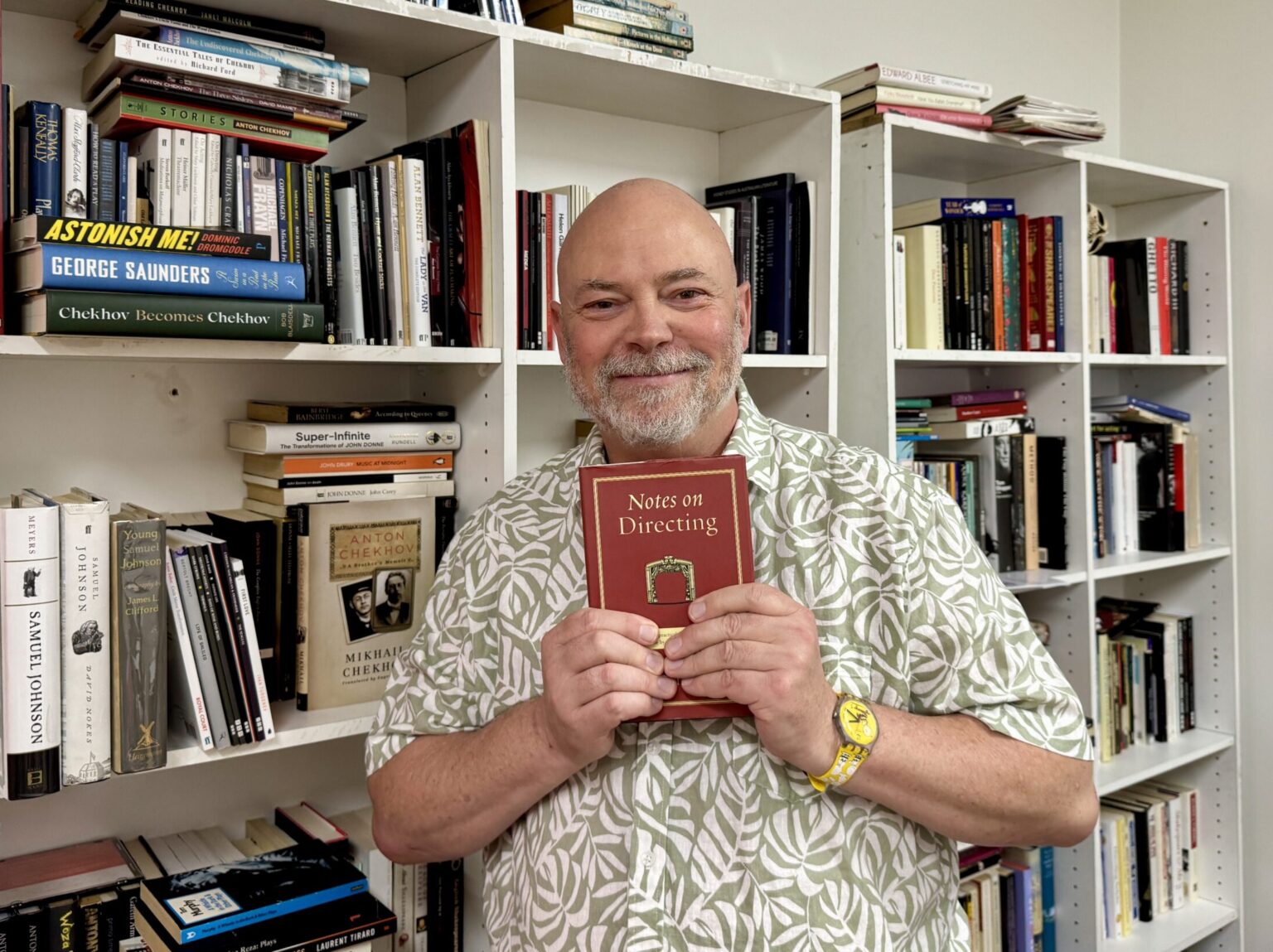Adam Cook has long been a quiet force in Australian theatre. Our students and team at Actors Centre Australia (ACA) are deeply grateful for Adam’s inspiring leadership as Head of Acting over the past decade. Today, we celebrate his achievement of directing 200 plays!
A graduate of the prestigious NIDA Directors Course, Adam has directed productions across Australia, the UK, Canada and the US. From his landmark tenure as Artistic Director of the State Theatre Company of South Australia to his current role shaping the next generation of performers at ACA, Adam’s career is marked by vision, rigour and an unshakable commitment to storytelling.
As he celebrates the remarkable milestone of directing his 200th play (Our Town at ACA), we sat down to talk about the journey so far. In this interview, Adam reflects on the evolution of his directing style, his passion for working with students, and the process behind bringing a script to life. He shares insights on collaborating with actors like Cate Blanchett, Toni Collette, and Ben Mendelssohn, and he reveals what continues to inspire him after decades in the director’s chair.
ACA: Congratulations on directing your 200th play! How does it feel to reach such an incredible milestone?
Adam: A life in the theatre was all I ever wanted and to be gainfully employed in my chosen career since 1989, well I’m pretty chuffed about that. I’ve never had to do anything else to earn a living and I’ve had shows tour to the UK, the US, and Canada. Before I came to ACA, in my former life as a freelance director, every year when the theatre companies were deciding who they’d give their directing gigs to, I’d get nervous wondering what work might come in for me, if any would! It’s a common feeling when you’re freelancing and actors know that feeling for sure. My agent said, “You’re one of the few directors in this country who’s in constant work, so just relax.” And I’m glad to be celebrating this milestone with a play as beautiful as Thornton Wilder’s Our Town.
ACA: You’ve been the Head of Acting at Actors Centre Australia for ten years now. What is the most rewarding part of directing drama school students?
Adam: Sharing what I know. I mean, I’ve been in the industry now for 35 years so I know how it works and I can pass that knowledge on, to help our students enter that world with the right mindset. Now it’s time for a new generation to shape the culture and my job is to create opportunities for them to do that while they’re in training, so when we, as I like to say, “release them back into the wild”, they’ve got the best chance of making an impact, because they’re one hundred per cent ready to do that.
ACA: Before ACA, you held the longest tenure as Artistic Director for the State Theatre Company of South Australia – close to a decade. What was your favourite part of that role?
Adam: I loved that job – and they kept renewing my contract! When I trained at NIDA in 1988, one of our guest directors, Jim Sharman, an icon of Australian theatre, said “You’re going to spend your career convincing people to let you do what you want to do, so start getting good at it now.” So I did that for fifteen years but when I was AD @ STCSA, I didn’t have to do that. The Board of Directors said, “We’re here to back your vision, you don’t have to justify it.” So as long as the finances worked, I could program whatever I wanted to do. Every year we had a surplus, like $100,000 or more – we were the envy of the other Major Performing Arts companies and at our regular meetings they’d ask, “How are you DOING that?!?” It was a Really Good Feeling, especially because it meant that audiences were excited to see what we were doing. And I got a huge buzz out of giving work to so many artists.
ACA: How has your approach to directing evolved from your first production to your 200th?
Adam: I’m more relaxed these days. I’ve been around long enough that I know my method works. I’m a quiet, clear, patient director. I don’t make a lot of noise but the productions do, in the sense that they’re impactful and I think that’s what kept me employed for so long. I tell the students that our job is to put the audience through it – whether they end up laughing themselves silly or they’re left motionless in shock and sobbing by the end. We’re in the entertainment business – and it’s our business to entertain. We’re creating an experience in real time for an audience, and we must never lose sight of that. I’m all about exploring and revealing the flawed, messy, bruised humanity of the characters, in all their glorious complexity and contradiction.
ACA: How do you choose the plays you want to direct, especially when working with students?
Adam: I have to be intrigued by the world of the play and excited enough to explore it. If I’m not passionate about the play, how could I encourage the actors to get on board? A lot of thought, time, and discussion goes into choosing the plays and casting them. I take that responsibility very seriously. Something students learn during their time with us, is Play the hand you’re dealt. Find value in what you are given to do and do your best with it. Once you graduate, you might get hired for a paying gig and you’re only in one scene and you’ll be like, “Oh my God, I’m in a play!”. So I try to encourage that way of thinking in our students too. As they say, there’s no such thing as small parts etc etc. And you know what? It’s true.
ACA: What is your process when preparing for a new production? How do you balance honouring a playwright’s original intent while also bringing your own creative vision?
Adam: It’s not a balance I need to find because it’s my job to honour the playwright. The play is bigger than us, that’s what has brought us together. I don’t have a signature style as a director and I’m glad about that. My focus is always on the acting, depth of connection to the character, clarity of intention and using the language to illuminate or expose them.
ACA: You’ve directed some big names in the industry like Murray Bartlett, Sarah Snook, Toni Collette, Ben Mendelssohn and Cate Blanchett. What qualities are essential in a great actor?
ACA: Showing up! Be a nice person, be prepared and good to work with. Invest in the process with an open heart and an open mind. And all of those actors that you mention are lovely people, they’re great collaborators brimming over with ideas.
ACA: How do you help students unlock emotional depth and authenticity in their performances?
Adam: By asking questions. It’s an approach I learned from Polonius, the father of Ophelia in Shakespeare’s Hamlet. He has a speech in which he says to a man he’s commissioned to spy on his son, “By indirections find directions out.” So instead of saying to an actor, “Do it like this”, I ask “Why do you think the character says that/responds in that way? What might happen if she didn’t? What if she said something else?” The actors feel trusted and empowered to solve the puzzle themselves, with some guidance from me. And of course, the old teacher’s maxim – STOP ACTING! If you feel it, the audience will see it.
ACA: Are there any teaching or directing moments that have left a lasting impact on you?
Adam: It’s always a thrilling moment when a student actor has a breakthrough in class or rehearsals for a show, when they finish the session with a knowledge that they’re made progress. But it’s more the productions that stay with me. In recent years the ones that I’ve worked that I’m inordinately fond of include Dancing at Lughnasa, Pride & Prejudice 2.0, The Importance of Being Earnest, Hedda Gabler, Waiting for Godot, and The Laramie Project. I have very broad taste in the kinds of plays I like to direct, always have. I’ve directed King Lear AND Bananas in Pyjamas. The kid’s got range!
One of the shows I directed really early on in my career and it’s still really vivid in my memory was the very first production of Louis Nowra’s Cosi, which I directed at Belvoir in 1992. The original cast featured Ben Mendelssohn, David Wenham, Kerry Fox, and a glorious, unforgettable performance by Barry Otto. David, Barry and Ben all ended up in the movie version. It was such a wonderful production, one of my very first and indelibly etched in my mind. People still talk about it, and that’s a lovely feeling.
ACA: After 200 plays, what’s next? Are there any stories you’re still eager to tell?
Adam: Every director has a wish list!
ACA: Anything else you’d like to share?
Adam: I’m writing a novel. I don’t get to work on it a lot because my work at ACA is all consuming, really, but I am happy to say, dear reader, that I am inching closer and closer to the finish line with my booky wooky! It’s called Boy Eternal.



